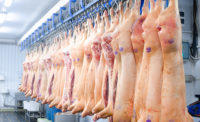One of the challenges that the meat industry routinely faces is finding enough capable employees. One of the challenges facing meat science students is to gain practical experience and make that transition from college into the “real world.” With a little effort, both groups can help each other out while bringing fresh talent and ideas into the meat business.
Hiring an intern can serve several purposes. For one, it gives a student some much-needed experience in the business world to supplement his or her university education. It also helps the employer gain a new perspective – and if the internship goes well, a potential new employee.
Land O’Frost, a Lansing, Ill., processor of deli meats, has had internships for years, but it has recently formalized its internship program, as well as a management training program that transitions interns and new hires into the company as full-time employees.
“We are now shifting a greater importance to training inexperienced employees in the LOF culture and way of doing business,” says John Butts, vice president of research. “We’re looking for fresh ideas, innovation and thinking out of the box.”
Butts says that the company offers a bright opportunity for new employees to come fresh out of school. The company’s goal is to have interns at each of its plants. Those interns will find plenty of opportunities to put their education to good use.
“Department managers identify projects which are meaningful to Land O’Frost and likewise will be good education experiences for the intern,” he explains. “Many of these projects are parts of larger initiatives that the company has. They may be focused on food safety, quality management, process improvement or product development.”
Certified Angus Beef places a similar value on education. The Wooster, Ohio, company has a long-standing relationship with The Ohio State University that goes back to Mick Colvin, the company’s founder. Today, CAB partners with OSU and Weber Grill to offer a Barbecue Science Class. The class is an easy way to introduce meat science to students and make them aware about the possibilities that are in the industry.
“It is just another way to engage students with something that was a little different and fun. Anytime you start grilling meat for college students, you’re going to get a lot of interest,” explains Mark McCully, vice president of production for CAB.
McCully notes that the company’s internships can vary, given the consumer focus of CAB. One recent intern led a summer grilling tour for Meijer. She visited stores in cities throughout Ohio, Indiana and Kentucky, preparing beef samples for customers and answering their questions. Another intern visited ranches to gather stories about farm families.
Several key CAB employees came into the company through internships. Deanna Walenciak is the director of marketing focused on education, and Amanda Wydner is an executive account manager in the Mid-Atlantic and Southeast regions and leads national foodservice business development for the brand.
“I think most employers would tell you internships are a great way to test drive a potential employee, to find out if they’re a good fit for you and you’re a good fit for them,” McCully says. “All the while, we’re preparing and giving that person some real-world education and experience, which is quite valuable to supplement their classroom learning.”




